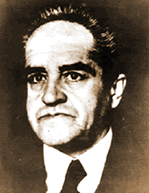Antonio Caso Andrade facts for kids
Quick facts for kids
Antonio Caso Andrade
|
|
|---|---|

Mexican Philosopher
|
|
| Born | December 19, 1883 Mexico City, Mexico
|
| Died | March 6, 1946 (aged 62) Mexico City, Mexico
|
| Nationality | Mexican |
| Alma mater | National Autonomous University of Mexico |
| Known for | 7th and 11th Rector of National Autonomous University of Mexico |
| Scientific career | |
| Fields | Philosophy, Law |
| Institutions | National Autonomous University of Mexico |
Antonio Caso Andrade (born December 19, 1883 – died March 6, 1946) was an important Mexican philosopher. He was also the head, or "rector," of the former Universidad Nacional de México. Today, this university is known as the National Autonomous University of Mexico. He served as rector from December 1921 to August 1923.
Along with José Vasconcelos, Antonio Caso helped start a group called the Ateneo de la Juventud. This group focused on humanism, which means they valued human beings and their experiences. They were against a way of thinking called "positivism." Positivism believed that only scientific facts could explain everything. Caso and his group thought that people were more than just scientific facts. They believed in a moral, willing, and spiritual side to individuals. Antonio was also the older brother of a well-known archaeologist, Alfonso Caso.
Antonio Caso's Ideas
In the summer of 1909, Antonio Caso began to share his ideas against positivism. He gave a series of talks that were later published. He was inspired by Christian thinkers like Blaise Pascal and Tolstoy.
Caso believed that human life has three main parts:
- The economic part (how we deal with money and resources)
- The aesthetic part (how we appreciate beauty and art)
- The moral part (how we decide what is right and wrong)
He disagreed with the idea that Mexico's future should be built only on scientific ideas. In his book "Discourses to the Mexican Nation," Caso criticized two big ideas of his time: "Jacobinism" (an extreme form of liberalism) and positivism. He felt that Jacobinism ignored real life, while positivism wrongly claimed that everything was set in stone.
Antonio Caso was a pioneer in Mexican philosophy. His ideas influenced later famous thinkers like Samuel Ramos, Leopoldo Zea Aguilar, and Octavio Paz. In his 1924 book, El problema de México y la ideología nacional (The Problem of Mexico and the National Ideology), Caso argued that Mexico's biggest challenge was a lack of unity. This included differences in race, culture, and society.
Towards the end of his life, Caso was influenced by other philosophers like Husserl, Scheler, and Heidegger. Their ideas appeared in his later books, such as La filosofía de Husserl (Husserl's Philosophy) and El peligro del hombre (The Danger of Man).
Works
- La filosofía de la intuición, 1914
- El concepto de la historia universal, 1918
- Principios de estética, 1925
- Sociología genética y sistemática, 1927
- El acto ideatorio, 1934
- El peligro del hombre, 1942
See also
 In Spanish: Antonio Caso para niños
In Spanish: Antonio Caso para niños

